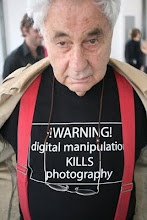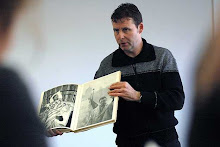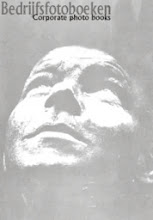 In Heimat, his previous collection of photographs published by Hatje Cantz, German photographer Peter Bialobrzeski, born in 1961, gave us pictures of his homeland that showed it as it had never been seen before. Photo International deemed it "one of the most beautiful and significant photography books this year." Even before that, Bialobrzeski's critically acclaimed exploration of the Asian mega-city phenomenon, Neon Tigers, had made him a common topic of debate on the international photography scene. Bialobrzeski's gift is for the portrayal of epic sweep in urban vistas, and of the energies that inhabit and galvanize them. In Lost in Transition the photographer applies his grand vision to the transformation of wasteland areas, many of which are located on the peripheries of cities. The photographs were taken in more than 28 cities (including Hamburg, Dubai, New York, Singapore, New Delhi and Kuala Lumpur) and 14 countries, and trace the transition from old to new, from the familiar to the abstract, from the dilapidated to the renewed. These images are as seductive and sublime as nineteenth-century Romantic paintings, but their apparent beauty is deceptive. As in his earlier works, Bialobrzeski always tests and pushes at the limitations of the documentary image itself.
In Heimat, his previous collection of photographs published by Hatje Cantz, German photographer Peter Bialobrzeski, born in 1961, gave us pictures of his homeland that showed it as it had never been seen before. Photo International deemed it "one of the most beautiful and significant photography books this year." Even before that, Bialobrzeski's critically acclaimed exploration of the Asian mega-city phenomenon, Neon Tigers, had made him a common topic of debate on the international photography scene. Bialobrzeski's gift is for the portrayal of epic sweep in urban vistas, and of the energies that inhabit and galvanize them. In Lost in Transition the photographer applies his grand vision to the transformation of wasteland areas, many of which are located on the peripheries of cities. The photographs were taken in more than 28 cities (including Hamburg, Dubai, New York, Singapore, New Delhi and Kuala Lumpur) and 14 countries, and trace the transition from old to new, from the familiar to the abstract, from the dilapidated to the renewed. These images are as seductive and sublime as nineteenth-century Romantic paintings, but their apparent beauty is deceptive. As in his earlier works, Bialobrzeski always tests and pushes at the limitations of the documentary image itself.About the AuthorPeter Bialobrzeski was born in Wolfsburg, Germany, in 1961. He was awarded first prize in the Art category at the prestigious World Press Photo Awards in 2003. His previous books are XXX Holy: Journeys into the Spiritual Heart of India and Neon Tigers.
 Lost in Transition, Photographs by Peter Bialobrzeski, Essays by Michael Glasmeier, Reviewed by Ruchi Shukla.
Lost in Transition, Photographs by Peter Bialobrzeski, Essays by Michael Glasmeier, Reviewed by Ruchi Shukla.Rapid advances in globalization, urbanization and industrialization have led to a wave of construction projects around the world. In developing economies, land has become the most important asset for the purposes of growth.
The large-scale construction projects being undertaken in major cities around the world transform wastelands into giant factories or residential complexes or restaurants. Instead of being silent spaces, they are being transformed into spaces with noise, light and people.
 Across the globe
Across the globeThis same storyline seems to be repeating itself around the world. In his book Lost in Transition, photographer Peter Bialobrzeski i has captured some of these sites from around the world. From Dubai to Germany and from the United States to India, there is a chain of sorts of these massive construction sites.
The photographs have been taken in 28 cities across 14 countries — and it is amazing to see how a similar transformation is happening around the world. We seem to be leaving the comfort of the known and moving towards the unknown — as represented by the empty landscapes around the new buildings.
The art of building has also seemed to change. Shiny steel and glass have taken the place of concrete and plaster. The powerful lights around the buildings seem to be placed as if for a Broadway show, with the building as the highlight of the program. It is almost as if these spaces in transition are works of art in themselves.
 A world in transition
A world in transitionOverall, the photography tells the story of a transitioning world economy and, in turn, a transitioning way of life. A brightly lit mall stands right next to the huts of the workers building a place where they might not be able to afford a single item.
Factories spring up in the middle of snow-capped peaks. Futuristic buildings stand among empty landscapes, making them more imposing than their real size would warrant.
Two worlds
Another interesting juxtaposition is that of the new world and the old — or the rich and the poor. In Kuala Lumpur, Peter Bialobrzeski captures a shack with the world-famous Petronas Towers in the background. It is like looking at the two sides of a coin — great development and then the people who have been left behind in the race.
Bialobrzeski’s images tell the story about a time to come. They capture the hope for a brighter future, literally. And like great works of art, they arouse wonder and awe.
About Peter Bialobrzeski
Peter Bialobrzeski is a professor at the Hochschule für Künste, Bremen. He sparked a great deal of interest on the photography scene with his previous books Neon Tigers and Heimat. Neon Tigers was an explorations of Asian mega-cities and won the German Photobook Prize and the Most Beautiful German Book Award.
About Michael Glasmeier
Michael Glasmeier is an essayist, journalist, exhibition curator and professor of art history at the Hochschule für Künste, Bremen. His work deals with the relation of visual art to music, language, film, photography, theater or comedy.














Geen opmerkingen:
Een reactie posten